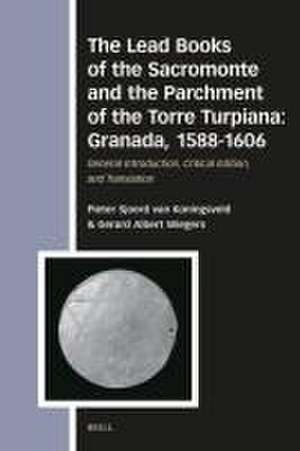The Lead Books of the Sacromonte and the Parchment of the Torre Turpiana: Granada, 1588-1606: General Introduction, Critical Edition, and Translation: Numen Book Series / Texts and Sources in the History of Religions, cartea 177
Autor Gerard A. Wiegers, P.S. Van Koningsvelden Limba Engleză Hardback – 28 noi 2023
Preț: 757.74 lei
Preț vechi: 924.07 lei
-18% Nou
Puncte Express: 1137
Preț estimativ în valută:
144.99€ • 151.93$ • 119.86£
144.99€ • 151.93$ • 119.86£
Carte indisponibilă temporar
Doresc să fiu notificat când acest titlu va fi disponibil:
Se trimite...
Preluare comenzi: 021 569.72.76
Specificații
ISBN-13: 9789004680852
ISBN-10: 9004680853
Pagini: 650
Dimensiuni: 155 x 235 mm
Greutate: 0.98 kg
Editura: Brill
Colecția Brill
Seria Numen Book Series / Texts and Sources in the History of Religions
ISBN-10: 9004680853
Pagini: 650
Dimensiuni: 155 x 235 mm
Greutate: 0.98 kg
Editura: Brill
Colecția Brill
Seria Numen Book Series / Texts and Sources in the History of Religions
Notă biografică
Pieter Sjoerd van Koningsveld, Ph.D. (1976), Leiden University, was until his retirement Professor of Islamic Studies at that university. He published widely on Al-Andalus and the history of Muslim minorities in Europe as well as on modern Islam. He passed away in 2021. His last monograph was entitled An Arabic Source of Ramon Martí. Al-Saif al-Murhaf fī al-Radd ʿalā al-Muṣḥaf (“The Whetted Sword in Refutation of the Koran”). Introductory Study with Text and Translation of its Surviving Fragments (Leiden: Aurora, 2018).
Gerard Albert Wiegers, Ph.D. (1991), Leiden University, is Professor of History and Comparative Religious Studies at the University of Amsterdam. He has published widely on the history of Muslim-Jewish-Christian relations and Muslim minorities in Europe. His most recent publication (co-edited with Mercedes García-Arenal) is entitled The Iberian Qurʾan. From the Middle Ages to Modern Times (Berlin and Boston: De Gruyter, 2022).
The two authors cooperated for many years in the study of the Arabic and Romance writings (often in Arabic script, Aljamiado) of the Muslim minorities in Medieval and Early Modern Christian Iberia. Their publications in this field have appeared in books and international peer-reviewed journals, such as, for example, their article ‘The Islamic Statute of the Mudejars in the Light of a New Source’ (Al-Qanṭara XVII, 1996).
Gerard Albert Wiegers, Ph.D. (1991), Leiden University, is Professor of History and Comparative Religious Studies at the University of Amsterdam. He has published widely on the history of Muslim-Jewish-Christian relations and Muslim minorities in Europe. His most recent publication (co-edited with Mercedes García-Arenal) is entitled The Iberian Qurʾan. From the Middle Ages to Modern Times (Berlin and Boston: De Gruyter, 2022).
The two authors cooperated for many years in the study of the Arabic and Romance writings (often in Arabic script, Aljamiado) of the Muslim minorities in Medieval and Early Modern Christian Iberia. Their publications in this field have appeared in books and international peer-reviewed journals, such as, for example, their article ‘The Islamic Statute of the Mudejars in the Light of a New Source’ (Al-Qanṭara XVII, 1996).
Cuprins
Preface
Acknowledgements
Abbreviations
List of Figures
General Introduction
Introduction: The Conquest of the City of Granada and Its Aftermath
1. The ‘Discovery’ of the Parchment of the Turpiana Tower, the Plates and the First Seven Lead Books (1588–1596)
2. The ‘Discovery’ of Lead Books 10–19 (1597–1599)
3. Lead Books 20–22 and the Evaluation Process in Spain (1600–1643)
4. The Lead Books in Rome
The translation work of Bartolomeo de Pettorano, the Vatican committees, and the condemnation of the Lead Books by Pope Innocent XI in 1682
5. Academic Studies on the Texts of the Parchment and the Lead Books
6. Material Aspects and Script
7. Style and Language
8. Edition and Translation: Methodological Aspects
9. Structure and Contents
10. Conclusions
Edition and Translation
Edition and Translation of the Parchment of the Torre Turpiana
Edition of the Lead Books
Translation of the Lead Books
Appendix: Edition and Translation of a Report about Four Fragments of Lead Books Found in Granada
Sources and Bibliography
General Index
Acknowledgements
Abbreviations
List of Figures
General Introduction
Introduction: The Conquest of the City of Granada and Its Aftermath
1. The ‘Discovery’ of the Parchment of the Turpiana Tower, the Plates and the First Seven Lead Books (1588–1596)
2. The ‘Discovery’ of Lead Books 10–19 (1597–1599)
3. Lead Books 20–22 and the Evaluation Process in Spain (1600–1643)
4. The Lead Books in Rome
The translation work of Bartolomeo de Pettorano, the Vatican committees, and the condemnation of the Lead Books by Pope Innocent XI in 1682
5. Academic Studies on the Texts of the Parchment and the Lead Books
6. Material Aspects and Script
7. Style and Language
8. Edition and Translation: Methodological Aspects
9. Structure and Contents
10. Conclusions
Edition and Translation
Edition and Translation of the Parchment of the Torre Turpiana
Edition of the Lead Books
Translation of the Lead Books
Appendix: Edition and Translation of a Report about Four Fragments of Lead Books Found in Granada
Sources and Bibliography
General Index









